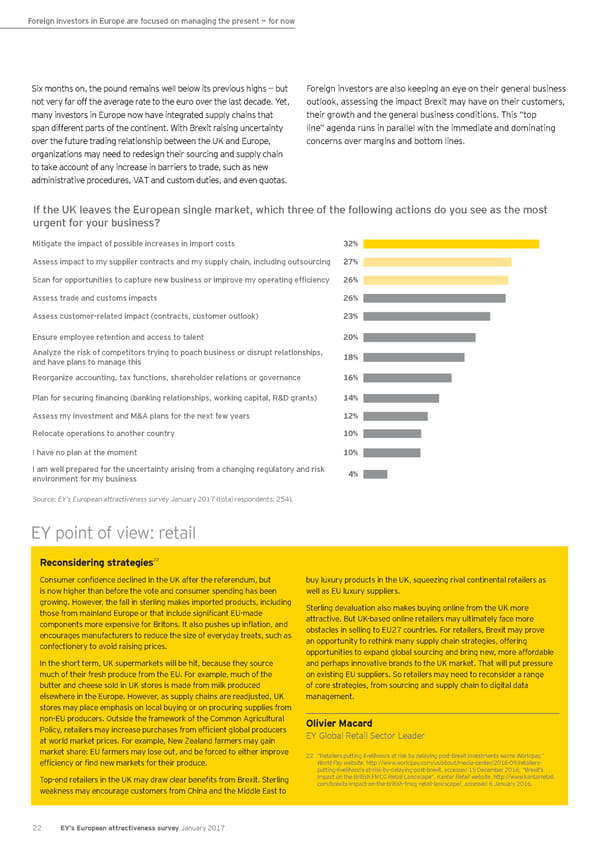Foreign investors in Europe are focused on managing the present — for now Six months on, the pound remains well below its previous highs — but Foreign investors are also keeping an eye on their general business not very far off the average rate to the euro over the last decade. Yet, outlook, assessing the impact Brexit may have on their customers, many investors in Europe now have integrated supply chains that their growth and the general business conditions. This “top span different parts of the continent. With Brexit raising uncertainty line” agenda runs in parallel with the immediate and dominating over the future trading relationship between the UK and Europe, concerns over margins and bottom lines. organizations may need to redesign their sourcing and supply chain to take account of any increase in barriers to trade, such as new administrative procedures, VAT and custom duties, and even quotas. If the UK leaves the European single market, which three of the following actions do you see as the most urgent for your business? Mitigate the impact of possible increases in import costs 32% Assess impact to my supplier contracts and my supply chain, including outsourcing 27% Scan for opportunities to capture new business or improve my operating efficiency 26% Assess trade and customs impacts 26% Assess customer-related impact (contracts, customer outlook) 23% Ensure employee retention and access to talent 20% Analyze the risk of competitors trying to poach business or disrupt relationships, 18% and have plans to manage this Reorganize accounting, tax functions, shareholder relations or governance 16% Plan for securing financing (banking relationships, working capital, R&D grants) 14% Assess my investment and M&A plans for the next few years 12% Relocate operations to another country 10% I have no plan at the moment 10% I am well prepared for the uncertainty arising from a changing regulatory and risk 4% environment for my business Source: EY’s European attractiveness survey January 2017 (total respondents: 254). EY point of view: retail Reconsidering strategies22 Consumer confidence declined in the UK after the referendum, but buy luxury products in the UK, squeezing rival continental retailers as is now higher than before the vote and consumer spending has been well as EU luxury suppliers. growing. However, the fall in sterling makes imported products, including Sterling devaluation also makes buying online from the UK more those from mainland Europe or that include significant EU-made attractive. But UK-based online retailers may ultimately face more components more expensive for Britons. It also pushes up inflation, and obstacles in selling to EU27 countries. For retailers, Brexit may prove encourages manufacturers to reduce the size of everyday treats, such as an opportunity to rethink many supply chain strategies, offering confectionery to avoid raising prices. opportunities to expand global sourcing and bring new, more affordable In the short term, UK supermarkets will be hit, because they source and perhaps innovative brands to the UK market. That will put pressure much of their fresh produce from the EU. For example, much of the on existing EU suppliers. So retailers may need to reconsider a range butter and cheese sold in UK stores is made from milk produced of core strategies, from sourcing and supply chain to digital data elsewhere in the Europe. However, as supply chains are readjusted, UK management. stores may place emphasis on local buying or on procuring supplies from non-EU producers. Outside the framework of the Common Agricultural Olivier Macard Policy, retailers may increase purchases from efficient global producers EY Global Retail Sector Leader at world market prices. For example, New Zealand farmers may gain market share: EU farmers may lose out, and be forced to either improve 22 “Retailers putting livelihoods at risk by delaying post-Brexit investments warns Worldpay,” efficiency or find new markets for their produce. World Pay website, http://www.worldpay.com/us/about/media-center/2016-09/retailers- putting-livelihoods-at-risk-by-delaying-post-brexit, accessed 15 December 2016; “Brexit’s Top-end retailers in the UK may draw clear benefits from Brexit. Sterling Impact on the British FMCG Retail Landscape”, Kantar Retail website, http://www.kantarretail. weakness may encourage customers from China and the Middle East to com/brexits-impact-on-the-british-fmcg-retail-landscape/, accessed 6 January 2016. 22 EY’s European attractiveness survey January 2017
 European attractiveness survey January 2017 Page 27 Page 29
European attractiveness survey January 2017 Page 27 Page 29